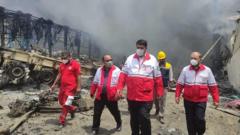In the aftermath of a massive explosion at Shahid Rajaee port, which resulted in at least 40 deaths and over a thousand injuries, Iran is grappling with a dual crisis of mourning and anger. Occurring on Saturday morning, the explosion prompted a surge of blood donors rushing to hospitals nationwide. Fires continue to rage, sending toxic smoke into the air, leading the health ministry to advise residents in nearby areas to remain indoors and don protective clothing until further notice.
### Anger Grows in Iran Following Catastrophic Port Explosion That Claims Lives

### Anger Grows in Iran Following Catastrophic Port Explosion That Claims Lives
The devastating explosion at Iran's largest port has left the nation in grief and outrage as fatalities rise and accountability is questioned.
Schools and offices in Bandar Abbas, close to the port, were closed to facilitate emergency responses. The local celebration that was supposed to be held nearby quickly turned into a somber memorial for those affected. In light of the tragedy, authorities declared a national day of mourning on Monday, and additional days of mourning in Hormozgan province.
As residents report feeling the explosion's effects even 50 kilometers away, fingers are pointed at the government regarding the mishandling of hazardous materials. Amber Intelligence, a maritime risk assessment agency, suggested that the explosion may have resulted from improper storage of solid fuel linked to Iranian ballistic missile operations. Reports have surfaced alleging that rocket fuel, specifically sodium perchlorate, may have been improperly stored at the port, contributing to the disaster. Iranian authorities have denied these claims while also facing scrutiny for their competence and responsibility in managing dangerous materials.
In the wake of the tragedy, President Masoud Pezeshkian visited the explosion site, pledging a thorough investigation into the incident. However, the Iranian defense ministry has refuted claims regarding military materials being at the port. Concerns loom over the potential economic impact on Iran, as the port handles nearly 80% of the country's imports, raising fears of imminent food shortages.
Meanwhile, international support has poured in, with condolences from several countries and offers of assistance in mitigating the aftermath of the disaster. As high-level discussions between Iranian and U.S. officials regarding Tehran's nuclear program were taking place in Oman at the time of the explosion, the incident adds a complex layer to Iran's already strained domestic and international situation.
As residents report feeling the explosion's effects even 50 kilometers away, fingers are pointed at the government regarding the mishandling of hazardous materials. Amber Intelligence, a maritime risk assessment agency, suggested that the explosion may have resulted from improper storage of solid fuel linked to Iranian ballistic missile operations. Reports have surfaced alleging that rocket fuel, specifically sodium perchlorate, may have been improperly stored at the port, contributing to the disaster. Iranian authorities have denied these claims while also facing scrutiny for their competence and responsibility in managing dangerous materials.
In the wake of the tragedy, President Masoud Pezeshkian visited the explosion site, pledging a thorough investigation into the incident. However, the Iranian defense ministry has refuted claims regarding military materials being at the port. Concerns loom over the potential economic impact on Iran, as the port handles nearly 80% of the country's imports, raising fears of imminent food shortages.
Meanwhile, international support has poured in, with condolences from several countries and offers of assistance in mitigating the aftermath of the disaster. As high-level discussions between Iranian and U.S. officials regarding Tehran's nuclear program were taking place in Oman at the time of the explosion, the incident adds a complex layer to Iran's already strained domestic and international situation.




















